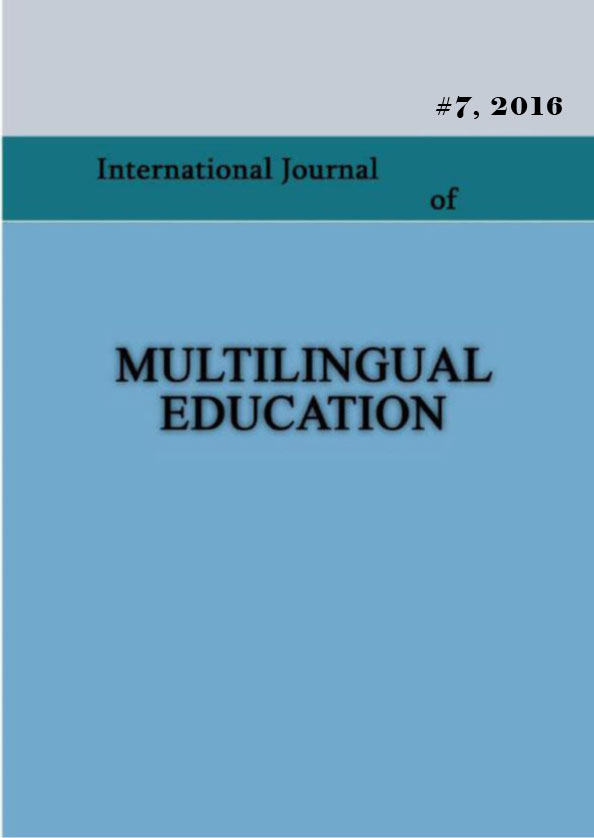Ethics and English Integrated Learning in Latvian Primary Schools
Keywords:
ethics, language, content, competence, integration, CLIL.Abstract
The article deals with the experience and reflection on teaching practice and Master’s Research Practice carried out in the Master’s Study Programme “Teacher”, focusing on the topicality of education nowadays; more specifically, interdisciplinarity and especially content and language integrated learning in primary school education. An idea of content and language integrated learning developed as an alternative to the existing methods through focusing on the features and challenges of ethics education in Latvia.
The article describes the case study on ethics and English integrated learning in primary school, including expert-interviews with primary school and ethics teachers and higher education lecturers who prepare lectures and courses for content and language integrated learning teachers. Interviews have been conducted to find out the role of value education and subject integration nowadays. Ethics and English integrated learning has been practised in the second grade. The data have been collected by a questionnaire at the end of the semester.
Recommendations for different target groups based on the theoretical and the research part of the research have been made.
References
Ābelnieks, R. (2012). Par latviešu valodas statusu sendienās. Available at: http://www.tb.lv/vertibas-nostaja/raitis-abelnieks-par-latviesu-valodas-statusu-sendienas [Accessed on 20.04.2015.]
Adams, S. (2014). The 10 Skills Employers Most Want In 2015 Graduates.Available at: http://www.forbes.com/sites/susanadams/2014/11/12/the-10-skills-employers-most-want- in-2015-graduates/ [Accessed on 28.04.2015.]
Adikibi, O., Baleins, B., Brejī, E., Derbišīrs, D., Dīens, M. I., Dīna – Dramonda, S. E., Tompsone, K. (1995). Ideju vārdnīca. Domātāji, teorijas un jēdzieni filozofijā, zinātnē, reliģijā, politikā, vēsturē un mākslā. Zvaigzne ABC
Andersone, R. (2010). Skolotāju profesionālā kompetence sabiedrības ilgtspējīgai attīstībai.
Pedagoģija un skolotāju izglītība. Rīga, Latvijas Universitāte
Austruma, S. (2005). Ētika 1.-3. klasei Rīga, Izglītības satura un eksaminācijas centrs.
CLIL: An interview with Professor David Marsh. International House Journal of education and development, 26. Available at: http://ihjournal.com/content-and-language-integrated- learning [Accessed on 05.03.2015.]
Coyle, D., Hood, P., Marsh, D. (2013). Content and Language Integrated Learning Cambridge: Cambridge University Press.
Druviete, I. (2012). Valodas situācija Latvijā 2004-2010. Riga: Latviešu valodas aģentūra. Druviete, I. (2015). Bilingvālā izglītība un CLIL: vēsturisks atskats un attīstības prognozes.
CLIL jeb mācību satura un valodas integrēta apguve: izglītības paradigmas maiņa. Rīga: Latviešu valodas aģentūra.
Grigule, L. (2014). Satura un valodas integrēta apguve. Studiju kursa materiāli. Rīga, Latvijas Universitāte.
Īpaša gadījuma izpēte. Available at: http://www.petijumi.lv/2011/08/ipasa-gadijuma-izpete/ [Accessed on 15.11.2014.]
ISAP (2004). Mācību process: sociālās zinības.
Lazdiņa, S. (2015). CLIL jeb mācību satura un valodas integrēta apguve: izglītības paradigmas maiņa. Rīga, Latviešu valodas aģentūra.
Poriņa, V. (2009). Valsts valoda daudzvalodīgajā sabiedrībā: individuālais un sociālais bilingvisms Latvijā. Rīga, LU Latviešu valodas institūts.
Skujiņa, V. (2000). Pedagoģijas terminu skaidrojošā vārdnīca. Rīga, Apgāds Zvaigzne ABC. US Legal Bilingualism. Historical Perspective. Available at: http://education.uslegal.com/bilingualism/historical-perspective/ [Accessed on 07.03.2015.]
Published
How to Cite
Issue
Section
License
Copyright (c) 2016 Kristīne Gailīte

This work is licensed under a Creative Commons Attribution-NonCommercial 4.0 International License.
Copyright (c) - Authors who publish with this journal agree to the following terms: Authors retain copyright and grant the journal the right of first publication with the work simultaneously licensed under a Creative Commons Attribution-Noncommercial 4.0 International License, which allows others to share the work with an acknowledgement of the work's authorship and initial publication in this journal. Authors are permitted and encouraged to post their work online (e.g., in institutional repositories or on their personal website) prior to and during the submission process, as it can lead to productive exchanges, as well as earlier and greater citation of published work (see The Effect of Open Access). Authors may enter into separate, additional contractual arrangements for the non-exclusive distribution of the journal's published version of the work (e.g., post it to a repository or publish it in a book), with an acknowledgement of its initial publication in this journal.

